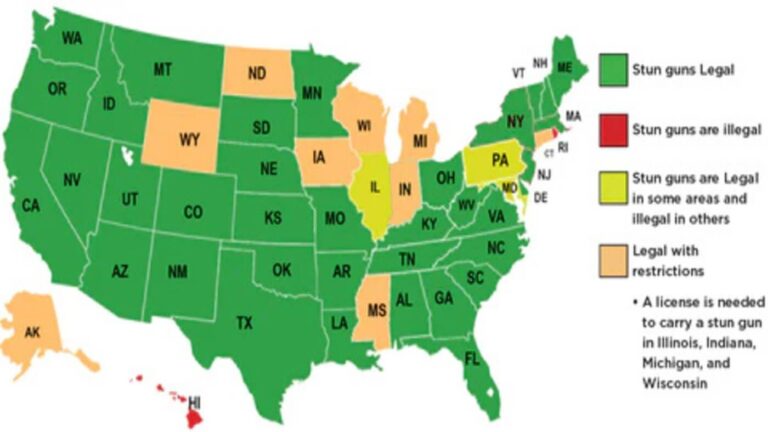Table of Contents
- Legal Repercussions of Violating Stun Gun Regulations
- Impact on Personal and Public Safety
- Understanding Jurisdictional Variations in Stun Gun Laws
- Steps to Ensure Compliance and Avoid Penalties
- Closing Remarks
Legal Repercussions of Violating Stun Gun Regulations
Violating stun gun regulations can lead to serious legal consequences that vary widely depending on the jurisdiction. Common penalties include hefty fines, confiscation of the device, and in more severe cases, criminal charges that may result in probation or imprisonment. Law enforcement agencies take the unauthorized possession, use, or sale of stun guns seriously, especially when these actions involve minors or occur in sensitive locations such as schools or government buildings. Understanding the specific laws in your area is essential to avoid inadvertently crossing legal boundaries and facing these harsh repercussions.
Beyond immediate legal penalties, individuals may encounter long-term consequences affecting their personal and professional lives. These can include:
- Permanent criminal records impacting employment opportunities
- Revocation of certain civil rights, such as firearm ownership
- Increased insurance premiums or denial of coverage
- Mandatory community service or participation in legal education programs
Impact on Personal and Public Safety
Violating stun gun laws poses significant risks to both personal safety and the broader community. When individuals wield these devices unlawfully, the risk of accidental injury escalates sharply-especially in high-stress situations where improper handling can lead to severe burns or even electrical shock injuries. Furthermore, misuse can provoke unpredictable reactions, potentially escalating confrontations rather than diffusing them. Understanding these dangers underscores why many jurisdictions enforce strict regulations to restrict stun gun possession and use to licensed or authorized users only.
On a public scale, illegal stun gun usage contributes to a heightened sense of insecurity and complicates law enforcement efforts. Authorities face challenges distinguishing between lawful self-defense and criminal use, which can delay critical response times or result in wrongful detentions. This erosion of trust impacts community safety initiatives and increases the likelihood of violence. Key concerns include:
- Increased potential for misuse in conflicts or crimes
- Interference with public safety protocols and emergency response
- Legal consequences that may exacerbate an already tense situation
Understanding Jurisdictional Variations in Stun Gun Laws
When it comes to stun gun regulations, the landscape across different regions can be remarkably diverse. States and municipalities often impose their own unique restrictions, ranging from outright bans to stringent licensing requirements. For instance, some areas prohibit possession entirely, while others allow stun guns but restrict their use to self-defense scenarios only. It’s crucial to recognize that what might be legal in one jurisdiction could lead to serious legal repercussions in another. Ignorance of these laws is rarely accepted as a defense, making it imperative for owners to stay informed about local regulations before purchasing or carrying a stun device.
Understanding these legal nuances means paying close attention to varied factors such as:
- Age restrictions for ownership and carry
- Requirements for permits or licenses
- Where stun guns can be legally carried-public spaces, schools, airports, etc.
- Specific models or voltage limits allowed by law
Failing to comply with these jurisdictional rules can result in consequences ranging from fines to criminal charges, including misdemeanors or felonies depending on the severity of the violation. Being proactive about compliance not only safeguards your rights but also prevents potential encounters with law enforcement that can escalate unnecessarily. An informed owner is a responsible owner – always verify your local stun gun legislation before making decisions that could impact your freedom and safety.
Steps to Ensure Compliance and Avoid Penalties
First and foremost, thoroughly research your local, state, and federal regulations before purchasing or carrying a stun gun. Compliance starts with understanding the specific laws that govern possession, usage, and transportation in your jurisdiction. Keep in mind that restrictions can vary widely-what’s legal in one area might be prohibited in another. Stay updated by consulting official government websites and trusted legal resources, and consider reaching out to local law enforcement agencies for clarification when necessary.
Additionally, implement clear personal guidelines to maintain adherence and avoid penalties. Consider these essential practices:
- Always carry the stun gun in a secure and concealed manner as required by law.
- Register the device if your jurisdiction mandates it, ensuring proper documentation is readily accessible.
- Avoid using the stun gun unless in legitimate self-defense situations to prevent criminal charges.
- Regularly attend safety and legal training sessions to stay informed about evolving regulations.
By taking these proactive steps, you not only protect yourself from hefty fines or legal trouble but also promote responsible ownership and safety.
Closing Remarks
In conclusion, understanding and respecting stun gun laws is crucial not only to avoid legal trouble but also to ensure public safety. These regulations vary widely by jurisdiction, and failing to comply can lead to serious consequences, including hefty fines, criminal charges, and even imprisonment. Staying informed about local laws and using stun guns responsibly can protect you from unintended legal issues. Ultimately, being diligent about these rules helps promote a safer community for everyone. Stay educated, stay legal, and carry responsibly.Check Our Other Blogs
- StunGun – Your Trusted Source for Stun Guns, Laws, and Self-Defense Tips
- PepperSprayLaws – Your Trusted Resource for Pepper Spray Information
- StunGunLaws – Your Trusted Guide to Stun Gun Legality and Safety



